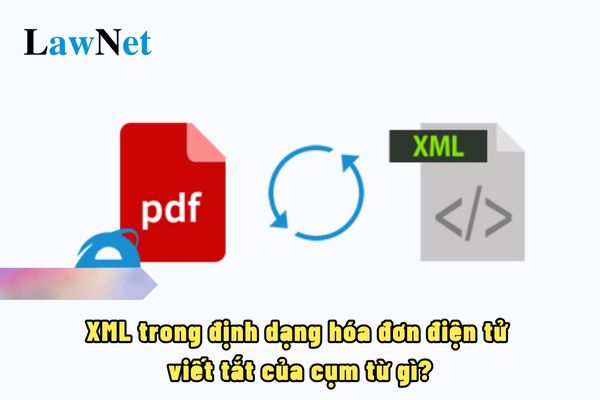Vietnam: What does XML in the format of e-invoices stand for?
Vietnam: What does XML in the format of e-invoices stand for?
Pursuant to Clause 1, Article 12 of Decree 123/2020/ND-CP, the regulation is as follows:
Format of e-invoices
1. The format of e-invoices is a technical standard that specifies the data type, data length of information fields for the transmission, storage, and display of e-invoices. The format of e-invoices uses the XML document format language (XML stands for "eXtensible Markup Language" in English, created with the intention of sharing e-data between IT systems).
2. The e-invoice format consists of two components: one that contains business data of e-invoices and another that contains digital signature data. For authenticated e-invoices, there is an additional component that contains data related to the tax authority code.
3. The General Department of Taxation develops and publishes the components containing the business data of e-invoices, digital signature data, and provides tools to display the contents of e-invoices as stipulated in this Decree.
4. Organizations and enterprises selling goods or providing services must fulfill the following requirements when transmitting e-invoice data to the tax authority directly:
a) Connect with the General Department of Taxation through a dedicated leased line or an MPLS VPN Layer 3 channel, comprising one main and one backup transmission channel. Each transmission channel must have a minimum bandwidth of 5 Mbps.
b) Use Web Service or Message Queue (MQ) with encryption as a method of connection.
c) Use the SOAP protocol to package and transmit data.
5. e-invoices must display their contents fully and accurately to prevent misunderstanding, ensuring that buyers can read them using e-means.
Thus, it can be seen that XML in the format of e-invoices stands for "eXtensible Markup Language" in English.

Vietnam: What does XML in the format of e-invoices stand for? (Image from the Internet)
What are regulations on using unauthenticated e-invoices when selling goods in Vietnam?
According to Article 18 of Decree 123/2020/ND-CP, the regulations are as follows:
Issuing unauthenticated e-invoices
1. Businesses and economic organizations are allowed to use unauthenticated e-invoices when selling goods or providing services after receiving acceptance notification from the tax authority.
2. Businesses and economic organizations use software to issue e-invoices when selling goods or providing services, digitally sign the e-invoice, and send it to the buyer electronically in accordance with the agreement between the seller and the buyer, ensuring compliance with the provisions of the law on e-transactions.
Therefore, based on the above regulation, enterprises using unauthenticated e-invoices must issue the e-invoices after receiving the acceptance notification from the tax authority.
Enterprises that use unauthenticated e-invoices must use software to create e-invoices when selling goods and send them to buyers electronically according to the agreement between seller and buyer, ensuring compliance with the law on e-transactions.
When shall enterprises be suspended from using e-invoices in Vietnam?
According to Article 16 of Decree 123/2020/ND-CP, the regulation is as follows:
- Enterprises, economic organizations, other organizations, households, and individual businesses fall into the following categories and must cease using authenticated e-invoices or without a tax authority code:
+ Enterprises, economic organizations, other organizations, households, and individual businesses cease the effectiveness of their tax identification numbers;
+ Enterprises, economic organizations, other organizations, households, and individual businesses are determined and notified by the tax authority as not operating at the registered address;
+ Enterprises, economic organizations, other organizations, households, and individual businesses notify the competent state management authority to temporarily cease business operations;
+ Enterprises, economic organizations, other organizations, households, and individual businesses receive a tax authority notice on ceasing to use e-invoices for tax enforcement purposes;
+ Cases involving the use of e-invoices to sell smuggled goods, banned goods, counterfeit goods, or goods infringing upon intellectual property rights discovered and notified to the tax authority by functional agencies;
+ Cases involving the issuance of e-invoices for the purpose of issuing fake goods or providing services to embezzle money from organizations or individuals discovered and notified to the tax authority by functional agencies;
+ Cases where business registration agencies or competent state agencies request enterprises to temporarily cease conditional business activities upon discovering that enterprises do not meet legal business requirements.
Based on the results of audits, if the tax authority detects that enterprises are established to conduct illegal trading or use e-invoices unlawfully to evade taxes, the tax authority will issue a decision to cease using e-invoices; the enterprise will be dealt with according to law provisions.

